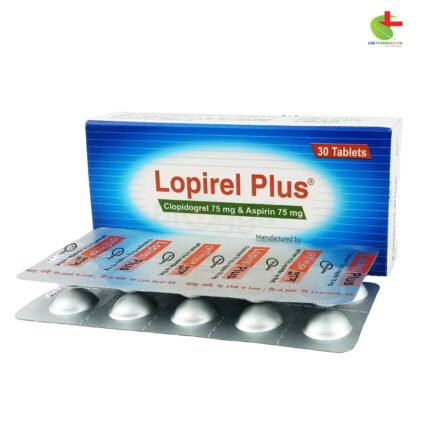Lopirel 75
120.00৳ Strip
- Lopirel (Clopidogrel) is an anti-platelet medication that reduces the risk of myocardial infarction and stroke.
- Indicated for patients with acute coronary syndrome, recent heart attacks, strokes, or peripheral arterial disease.
- Works by inhibiting platelet aggregation through its active metabolite.
- Administered orally, it can be taken with or without food; dosage varies by condition.
- Always consult a healthcare professional before use.
 Brand
Brand
|
Incepta Pharmaceuticals Ltd |
|---|---|
 Generics
Generics
|
Clopidogrel Bisulphate |
 Type
Type
|
Tablet |
Indications
Acute Coronary Syndrome (ACS): Clopidogrel is prescribed to decrease the incidence of myocardial infarction (MI) and stroke in patients experiencing non-ST-segment elevation ACS, including unstable angina (UA) and non-ST-elevation myocardial infarction (NSTEMI). It is also effective in lowering the risk of these events in those with acute ST-elevation myocardial infarction (STEMI).
Recent Myocardial Infarction, Stroke, or Established Peripheral Arterial Disease: This medication is indicated for patients with a history of recent MI, recent stroke, or established peripheral arterial disease to reduce the likelihood of further MI and stroke.
Please consult a registered healthcare professional before using this medication.
Pharmacology
Clopidogrel acts as a prodrug, inhibiting platelet activation and aggregation by irreversibly binding to the P2Y12 ADP receptor on platelets. Notable platelet aggregation inhibition is observable just 2 hours after a single oral dose. With repeated dosing of 75 mg daily, platelet aggregation is effectively inhibited on the first day, reaching a steady state between Days 3 and 7.
Dosage & Administration
Acute Coronary Syndrome: For immediate antiplatelet action, initiate with a single oral loading dose of 300 mg (4 tablets), followed by 75 mg once daily. Starting without a loading dose can delay the antiplatelet effect.
Recent MI, Recent Stroke, or Established Peripheral Arterial Disease: Administer 75 mg orally once daily, without a loading dose.
This medication can be taken with or without food.
Please consult a registered healthcare professional before using this medication.
Interactions
- NSAIDs, Warfarin, SSRIs, SNRIs: Concomitant use may heighten the risk of bleeding.
- CYP2C19 Inhibitors (e.g., Omeprazole, Esomeprazole): Avoid simultaneous use, as these can reduce the effectiveness of clopidogrel.
- Repaglinide (CYP2C8 Substrates): Co-administration is not recommended, as it can increase Repaglinide levels in the bloodstream.
Contraindications
Clopidogrel should not be used in individuals with a known hypersensitivity to the drug or any of its components, or in cases of active pathological bleeding (e.g., peptic ulcer or intracranial hemorrhage).
Side Effects
Clopidogrel is generally well-tolerated, but potential side effects include:
- Common: Bleeding, diarrhea, gastrointestinal discomfort, skin reactions.
- Rare: Acquired hemophilia, anemia, angioedema, joint pain, bone marrow disorders.
Pregnancy & Lactation
There is limited data on the use of clopidogrel in pregnant women. It should only be used during pregnancy if clearly necessary. It is unknown if clopidogrel is excreted in breast milk; decisions regarding breastfeeding or discontinuation of the drug should weigh the benefits for the mother against potential risks.
Precautions & Warnings
- Genetic variations affecting CYP2C19 may reduce the effectiveness of clopidogrel; concurrent use with CYP2C19 inhibitors like Omeprazole should be avoided.
- Clopidogrel inhibits platelet aggregation for the lifespan of the platelet (7-10 days), increasing the risk of bleeding. For effective hemostasis, platelet transfusions may be less effective if given soon after the loading or maintenance doses.
- Discontinuing clopidogrel heightens the risk of cardiovascular events; it should be stopped 5 days prior to elective surgeries with a high bleeding risk and resumed post-surgery when hemostasis is achieved.
- Cases of Thrombotic Thrombocytopenic Purpura (TTP) have been documented, necessitating urgent medical intervention including plasmapheresis.
- Hypersensitivity reactions such as rash or angioedema may occur, particularly in individuals with a history of sensitivity to other thienopyridines.
Use in Special Populations
The safety and efficacy of clopidogrel in pediatric populations have not been established. No dosage adjustments are necessary for elderly patients.
Overdose Effects
An overdose may result in bleeding complications. In such cases, platelet transfusions may help restore clotting function.
Therapeutic Class
Anti-platelet Drugs
Storage Conditions
Store below 30°C in a dry environment, away from light. Do not freeze. Keep out of reach of children.













Reviews
There are no reviews yet.